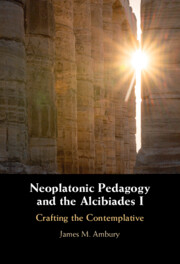8 results
Chapter 3 - How Should I Live?
-
- Book:
- Neoplatonic Pedagogy and the Alcibiades I
- Published online:
- 16 May 2024
- Print publication:
- 23 May 2024, pp 75-151
-
- Chapter
- Export citation
Chapter 1 - The Self-Knowledge Necessity
-
- Book:
- Neoplatonic Pedagogy and the Alcibiades I
- Published online:
- 16 May 2024
- Print publication:
- 23 May 2024, pp 12-27
-
- Chapter
- Export citation
Introduction
-
- Book:
- Neoplatonic Pedagogy and the Alcibiades I
- Published online:
- 16 May 2024
- Print publication:
- 23 May 2024, pp 1-11
-
- Chapter
- Export citation
Chapter 5 - Who Am I?
-
- Book:
- Neoplatonic Pedagogy and the Alcibiades I
- Published online:
- 16 May 2024
- Print publication:
- 23 May 2024, pp 167-209
-
- Chapter
- Export citation
Chapter 2 - Exalting Eros
-
- Book:
- Neoplatonic Pedagogy and the Alcibiades I
- Published online:
- 16 May 2024
- Print publication:
- 23 May 2024, pp 28-74
-
- Chapter
- Export citation
Chapter 4 - What Do I Want?
-
- Book:
- Neoplatonic Pedagogy and the Alcibiades I
- Published online:
- 16 May 2024
- Print publication:
- 23 May 2024, pp 152-166
-
- Chapter
- Export citation

Neoplatonic Pedagogy and the Alcibiades I
- Crafting the Contemplative
-
- Published online:
- 16 May 2024
- Print publication:
- 23 May 2024
Chapter 4 - Ethics, Virtue and Theurgy
- from Part I - Ethics across the Late-antique and Byzantine Period
-
-
- Book:
- The Reception of Greek Ethics in Late Antiquity and Byzantium
- Published online:
- 15 June 2021
- Print publication:
- 24 June 2021, pp 69-82
-
- Chapter
- Export citation


